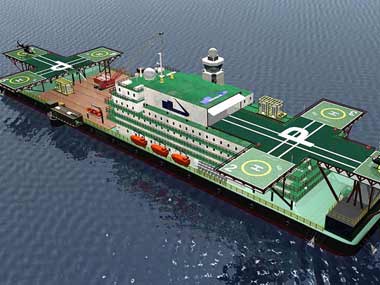New York: A California start-up company, Blueseed, has hit on an ingenious way to get around time-consuming, hard-to-get US visas. It is floating a new incubator to be based on a ship, about 20 km off the California coast. The ship will host some 1,000 entrepreneurs just a few miles from San Francisco, the heart of Silicon Valley. The main draw for the floating “seastead” is its clever location in international waters but close enough to Silicon Valley - so that occupants, using easier-to-obtain tourist visas and short-term business visas, can hop a quick ferry ride to meet with US venture capitalists and tech employers on shore. The “seastead” is being billed as “a perfect solution” for non-US tech entrepreneurs looking for a way to get closer to Silicon Valley. Blueseed CEO Max Marty came up with the idea of the “seastead” after seeing many of his Indian, Chinese and foreign MBA classmates at the University of Miami head back to their home countries after failing to secure US work visas. Two of Blueseed’s co-founders are immigrants, and Marty is the son of two Cuban immigrant parents. [caption id=“attachment_148810” align=“alignleft” width=“380” caption=“Blueseed’s concept ship that could accommodate 1,000 people off California’s shore so occupants can network with Silicon Valley investors. Courtesy: Intership Ltd”]  [/caption] “We plan to launch in the third quarter of 2013, offering living and office space in an elegantly designed modern tech environment so compelling that it will be called the ‘Googleplex of the Sea,’ attracting top entrepreneurial and technology talent from all over the world to Silicon Valley,” said Max Marty, CEO and co-founder of BlueSeed. The live-work ship will have modern office spaces, high-speed Internet, gyms, game rooms, cafes, 24-hour catering, a post office and medical services. Basic accommodations will start at around $1,200 per person, per month — a significant discount from what one might expect to pay to live in or near San Francisco. The average monthly rent for a studio apartment in San Francisco is $1,750 and incubator spaces sell for $400 to $650 per desk. If you are an Indian entrepreneur and fancy living on the Blueseed ship, you’ll have to enter the US first before boarding the ship. To be allowed to legally come to the US mainland, you will have to get a B1 (business) or B2 (tourist) visa. These visas are usually valid for 10 years and are often combined into a B1/B2 business/pleasure visa. If you intend to never step foot on the US mainland from the Blueseed ship, except in transit to another country, you can work with a simple US transit visa. Technology news site VentureBeat reported that the Blueseed team is attempting to raise half a million dollars by next summer and will see its first round of funding led by big-name investor and Paypal founder Peter Thiel. “After raising this initial seed round, Blueseed will need to raise a larger round to buy the ship that will house the entrepreneurs; currently, the team estimates needing between $10 million and $30 million for this ambitious project,” reported VentureBeat. “So we’re having to resort to the ‘Smart Boat’ to get the talent we need?” Angela Kelley of the Center for American Progress told USA Today. “If this doesn’t sound the alarms to policymakers that we need to revamp our immigration policies, nothing will.” Indian firms have complained bitterly this year about the US government being stingy about H-1B visas. Unmoved, the US State Department has pointed out that there has been a 24 percent jump in issuance rates from 54,111 issued in 2010 to 67,195 in 2011.
Talk about offshoring! A Silicon Valley start-up is floating an idea to help techies beat the visa blues - by living and working on a ship moored off the California coast.
Advertisement
End of Article


)

)
)
)
)
)
)
)
)



